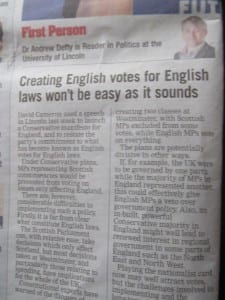 The House of Commons Public Administration and Constitutional Affairs Committee is currently conducting an inquiry into the issue of English votes for English laws, and the wider impact of these proposals on the future of the Union. This is a short piece on the subject which I wrote for The Lincolnshire Echo in April, in the run-up to the general election. The Prime Minister had just used a speech in Lincoln to launch the party’s ‘English manifesto’.
The House of Commons Public Administration and Constitutional Affairs Committee is currently conducting an inquiry into the issue of English votes for English laws, and the wider impact of these proposals on the future of the Union. This is a short piece on the subject which I wrote for The Lincolnshire Echo in April, in the run-up to the general election. The Prime Minister had just used a speech in Lincoln to launch the party’s ‘English manifesto’.
David Cameron used a speech in Lincoln last week to launch a Conservative manifesto for England, and to restate the Conservatives’ commitment to what has become known as English votes for English laws. Under Conservative plans MPs representing Scottish constituencies would be prevented from voting on issues which only affect England.
There are, however, considerable practical and political difficulties to the implementation of such a policy. Firstly, it is far from clear what constitute English laws. While the Scottish Parliament can, with relative ease, take decisions which only affect Scotland, most decisions taken at Westminster, and particularly those relating to spending, have implications for the whole of the UK. There are also significant political and constitutional implications. Constitutional experts have warned of the dangers of creating two classes of MPs at Westminster, with Scottish MPs excluded from some votes, while English MPs vote on everything.
The proposals are also potentially divisive in other ways. If, for example, the UK were to find itself governed by one party, while the majority of MPs in England represented another, this could effectively give English MPs a veto over government policy. Moreover, given the likelihood that the majority of English MPs will be Conservative, it is not clear how those parts of England which do not traditionally vote Conservative will react. While support for self-government for the English regions has been muted, an in-built and powerful Conservative majority in England might well lead to renewed interest in regional government in some parts of England such as the North East, and the North West.
Playing the nationalist card at this point may well be an astute political move on the part of the Conservatives which may attract votes in places like Lincolnshire, but the challenges involved in implementing and the long-term implications of such a policy are far from clear.
